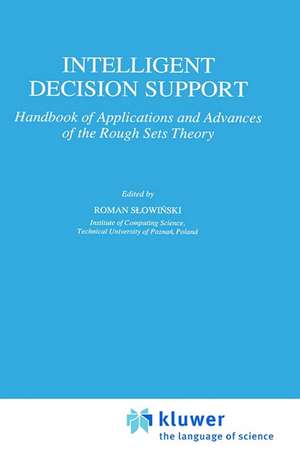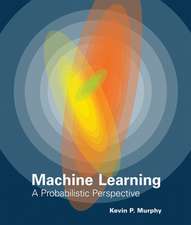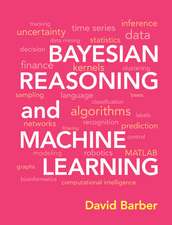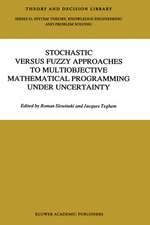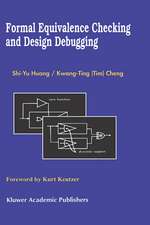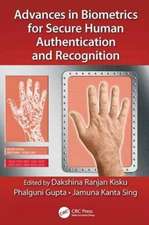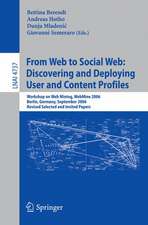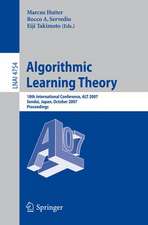Intelligent Decision Support: Handbook of Applications and Advances of the Rough Sets Theory: Theory and Decision Library D:, cartea 11
Editat de Shi-Yu Huangen Limba Engleză Hardback – 31 aug 1992
Knowledge is understood here as an ability to classify objects. Objects being in the same class are indiscernible by means of attributes and form elementary building blocks (granules, atoms). In particular, the granularity of knowledge causes that some notions cannot be expressed precisely within available knowledge and can be defined only vaguely. In the rough sets theory created by Z. Pawlak each imprecise concept is replaced by a pair of precise concepts called its lower and upper approximation. These approximations are fundamental tools and reasoning about knowledge.
The rough sets philosophy turned out to be a very effective, new tool with many successful real-life applications to its credit.
It is worthwhile stressing that no auxiliary assumptions are needed about data, like probability or membership function values, which is its great advantage.
The present book reveals a wide spectrum of applications of the rough set concept, giving the reader the flavor of, and insight into, the methodology of the newly developed disciplines. Although the book emphasizes applications, comparison with other related methods and further developments receive due attention.
| Toate formatele și edițiile | Preț | Express |
|---|---|---|
| Paperback (1) | 1907.31 lei 6-8 săpt. | |
| SPRINGER NETHERLANDS – 15 dec 2010 | 1907.31 lei 6-8 săpt. | |
| Hardback (1) | 1914.09 lei 6-8 săpt. | |
| SPRINGER NETHERLANDS – 31 aug 1992 | 1914.09 lei 6-8 săpt. |
Din seria Theory and Decision Library D:
- 20%
 Preț: 989.46 lei
Preț: 989.46 lei - 18%
 Preț: 1228.96 lei
Preț: 1228.96 lei - 18%
 Preț: 1836.63 lei
Preț: 1836.63 lei - 18%
 Preț: 950.52 lei
Preț: 950.52 lei - 18%
 Preț: 950.03 lei
Preț: 950.03 lei - 20%
 Preț: 366.86 lei
Preț: 366.86 lei -
 Preț: 399.88 lei
Preț: 399.88 lei -
 Preț: 394.29 lei
Preț: 394.29 lei - 18%
 Preț: 950.66 lei
Preț: 950.66 lei - 18%
 Preț: 952.40 lei
Preț: 952.40 lei - 15%
 Preț: 642.03 lei
Preț: 642.03 lei - 18%
 Preț: 1229.73 lei
Preț: 1229.73 lei - 18%
 Preț: 1231.64 lei
Preț: 1231.64 lei -
 Preț: 384.70 lei
Preț: 384.70 lei - 20%
 Preț: 2585.29 lei
Preț: 2585.29 lei
Preț: 1914.09 lei
Preț vechi: 2392.60 lei
-20% Nou
Puncte Express: 2871
Preț estimativ în valută:
366.31€ • 381.02$ • 302.41£
366.31€ • 381.02$ • 302.41£
Carte tipărită la comandă
Livrare economică 14-28 aprilie
Preluare comenzi: 021 569.72.76
Specificații
ISBN-13: 9780792319238
ISBN-10: 0792319230
Pagini: 496
Ilustrații: XVII, 473 p.
Dimensiuni: 210 x 297 x 32 mm
Greutate: 0.87 kg
Ediția:1992
Editura: SPRINGER NETHERLANDS
Colecția Springer
Seria Theory and Decision Library D:
Locul publicării:Dordrecht, Netherlands
ISBN-10: 0792319230
Pagini: 496
Ilustrații: XVII, 473 p.
Dimensiuni: 210 x 297 x 32 mm
Greutate: 0.87 kg
Ediția:1992
Editura: SPRINGER NETHERLANDS
Colecția Springer
Seria Theory and Decision Library D:
Locul publicării:Dordrecht, Netherlands
Public țintă
ResearchCuprins
I. Applications of the rough sets approach to intelligent decision support.- 1. LERS-a system for learning from examples based on rough sets.- 2. Rough sets in computer implementation of rule-based control of industrial processes.- 3. Analysis of diagnostic symptoms in vibroacoustic diagnostics by means of the rough sets theory.- 4. Knowledge-based process control using rough sets.- 5. Acquisition of control algorithms from operation data.- 6. Rough classification of HSV patients.- 7. Surgical wound infection — conducive factors and their mutual dependencies.- 8. Fuzzy inference system based on rough sets and its application to medical diagnosis.- 9. Analysis of structure — activity relationships of quaternary ammonium compounds.- 10. Rough sets-based study of voter preference in 1988 U. S. A. presidential election.- 11. An application of rough set theory in the control of water conditions on a polder.- 12. Use of “rough sets” method to draw premonitory factors for earthquakes by emphasing gas geochemistry: the case of a low seismic activity context, in Belgium.- 13. Rough sets and some aspects of logic synthesis.- II. Comparison with related methodologies.- 1. Putting rough sets and fuzzy sets together.- 2. Applications of fuzzy-rough classifications to logics.- 3. Comparison of the rough sets approach and probabilistic data analysis techniques on a common set of medical data.- 4. Some experiments to compare rough sets theory and ordinal statistical methods.- 5. Topological and fuzzy rough sets.- 6. On convergence of rough sets.- III. Further developments.- 1. Maintenance of knowledge in dynamic information systems.- 2. The discernibility matrices and functions in information systems.- 3. Sensitivity of rough classification to changes in norms of attributes.-4. Discretization of condition attributes space.- 5. Consequence relations and information systems.- 6. Rough grammar for high performance management of processes on a distributed system.- 7. Learning classification rules from database in the context of knowledge-acquisition and -representation.- 8. ‘RoughDAS’ and ‘RoughClass’ software implementations of the rough sets approach.- Appendix: Glossary of basic concepts.
